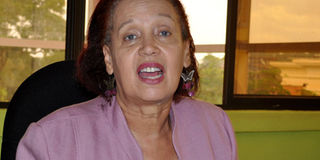It’s time to root for strategic partnerships to end tuberculosis

Dr Maggie Kigozi. File PHOTO
What you need to know:
TB fight. Ending TB calls for concerted efforts by a range of partners, including Civil Society Organisations, faith-based organisations, Local Government, private clinics, health workers, community leaders, policy makers and community involvement. We must all make TB a priority and work towards its elimination.
As the coronavirus pandemic sweeps the world, health workers working to fight tuberculosis (TB) have growing anxiety about what this pandemic will do to a much older infectious killer.
Under the theme ‘It’s Time’, the spotlight this year is on urgently accelerating the TB response to save lives and end suffering, building on high level commitments by Heads of State at the 2018 UN High-Level Meeting on TB.
Each year, we commemorate World Tuberculosis (TB) Day on March 24 to raise public awareness about the devastating health, social and economic consequences of TB, and to step up efforts to end the global TB epidemic.
TB remains the world’s deadliest infectious killer. Each day, more than 4,000 people lose their lives to TB, and close to 30,000 people fall ill with this preventable and curable disease. Global efforts to combat TB have saved an estimated 58 million lives since the year 2000. To accelerate the TB response in countries to reach targets – Heads of State came together and made strong commitments to end TB at the first-ever UN High Level Meeting in September 2018.
Tuberculosis remains a major public health problem in Uganda, with an annual incidence of 330 cases of all forms, and 136 new smear positive cases per 100,000 people per year.
It is estimated that about 60 per cent of the TB patients are co-infected with HIV/Aids. Uganda is one of the 22 high TB burden countries in the world, and we register about 5,000 TB-related deaths a year.
A multi- sectoral level approach to enhance TB case finding should be put in place, starting with increasing strategic investments for TB control and better utilisation of available diagnostics.
There is urgent need to expand TB screening and diagnostic services to the different levels, with emphasis on TB hotspots and high risk population (prisons, health workers, congregate settings, People living with HIV/Aids, diabetics, slum dwellers and contacts of confirmed and infectious TB patients).
Ending TB calls for concerted efforts by a range of partners, including Civil Society Organisations, faith-based organisations, Local Government, private clinics, health workers, community leaders, policymakers and community involvement. We must all make TB a priority and work towards its elimination.
Over the years, the Uganda Country Coordinating Mechanism (CCM) has implemented Global Fund activities through the different implementing partners. So far, Global Fund committed about $18.5m (about Shs180b) to TB programming.
Currently, the Uganda CCM is in the process of preparing Uganda’s Global Fund grant applications for the implementation period 2021 – 2023. Based on the Global Fund board’s decision in November 2019 on the funding available for the 2020-2022 allocation period, Uganda has been allocated $580m (about Shs5.6 trillion) for HIV, tuberculosis, malaria and building resilient and sustainable systems for health (RSSH), making Uganda the 5th highest recipient of Global Fund support in the world.
Tuberculosis has been allocated $30m (Shs291b) and this is to run from January 1, 2021 to December 31, 2023.
The glaring progress in the fight against TB in Uganda cannot be understated. Tuberculosis treatment outcomes have improved, with more TB patients completing treatment and getting cured, leading to increased treatment success rates from 44 per cent in 1995 to about 72 per cent in 2019.
The current state of affairs calls for renewed efforts to address the TB epidemic. Given that the available public health actions are missing more than half the expected number of TB patients, as well as up to 85 per cent of drug-resistant TB patients, there is an urgent need for innovative strategies to improve TB prevention, case finding; treatment to completion and management of drug-resistant TB.
As the coronavirus is moving to low-income countries, we’re deeply concerned about the impact it could have among populations with high HIV prevalence or malnourished children. We’re calling on partners and individuals to do everything they can to stop transmission and we reduce the TB incidences together.
All partners need to support efforts geared towards systematic TB case finding, focusing on the most-at-risk groups for TB including; prisoners, people living with HIV/Aids, diabetes, children below 15 years, men, refugees and internally displaced persons, pastoralists and nomadic communities; people in hard-to-reach areas, including urban slum residents and urban poor, and contacts of persons confirmed to have multi-drug resistant TB, among others.
Lastly, advocacy is critical to make sure TB does not become completely invisible during the pandemic. As Deepti Chavan, a TB survivor, put it, “People are leaving no stone unturned to stop the coronavirus pandemic. If we show even half of this dedication towards ending TB, we can stop millions from dying from a preventable and curable disease.”


